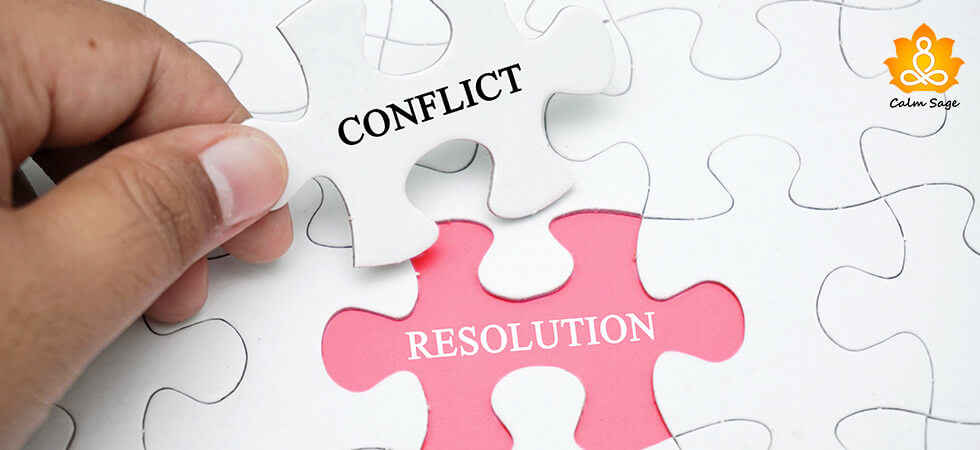Conflict Resolution: 12+ Mistakes To Avoid During Conflict Diffusion

Everyone says communication is the key to diffusing conflicts the right way, but those people forget to add what’s the right amount of communication or what’s the right communication style for resolving conflicts. It’s important to use your communication skills accurately to improve trust, intimacy, or overall relationship. Sometimes, over-communication and lack of communication can be one of the major reasons behind conflict.
The right key to managing conflicts is to maintain the right balance. In severe situations, miscommunication may result in contempt, mistrust, and stress. When it comes to relationships, we constantly make mistakes unintentionally which escalates conflicts instead of resolving them.
In this blog, I have listed 12+ mistakes that we must avoid during conflict resolution. So, let’s get started!
10+ Mistakes to Avoid When Resolving Conflict
1. Choosing silence when all’s said and done
You guys had an argument, you have everything that can be avoided, and now you both are choosing silence. Will this resolve your issues? No, instead, choosing silence will build up your frustration level. Or in some situations, one partner doesn’t speak at all, they choose silence over everything and within a minute they are ready to explode and speak things that not only show anger but also hurt, pinch, and disrespect the sentiments of the other partner. If one of these situations is your pattern for dealing with a conflict, you must avoid both of them and instead, you can do this:
What to do: It’s always healthier to choose the right words and express your feelings with the right communication skills. In some situations, speaking too much and too little can be toxic. Therefore, take the help of assertive communication skills, be respectful towards each other, and maintain the right amount of communication during those bloomy days.
2. Being overly defensive and avoiding personal issues
Sometimes, we know we are making mistakes or being the problematic ones, but still, we choose defensiveness to gain that victory sign in a relationship. Or sometimes, we are willing to understand other’s viewpoints, but we often lack a deeper understanding of ourselves.
Whatever the situation, you might win the victory sign with defensiveness but deep down you’ll be hurting your partner or your relationship. Denying your actions may lead to toxicity, stress, and long-term problems in your relationship instead you can do this:
What to do: In place of defensiveness, develop empathy towards each other, think about your problematic actions, acknowledge your personal issues, and work on improving your relationship together.
3. Digging upon the past
Whenever something goes wrong, some people automatically start to bring past mistakes even after feeling sorry for those mistakes. Some people continuously over-generalize things like, “You never did….and you never will” or “You have always done this to me and I know you’re not going to change.” Such phrases can act as deal-breakers in relationships. Here’s what you can do instead:
What to do: Digging into the past is like taking an off-road course filled with negativity. Herein, change your viewpoint, remember your goals, work on finding resolutions instead of increasing them, and discuss your issues with your partner with patience.
4. Overgeneralizing your “righteousness”
Do you know when we stop evolving in our relationships? When we start thinking that we’re right, we stop evolving. It’s quite damaging to look at every situation and say, “I have done the right thing”, “I am always right”, and other phrases which make you look right.
See, every person has their opinions, maybe you’re right in your outlook, and maybe your partner doesn’t see things the same way. No, they are not asking you to change, they only want you to shift your perspective and reflect according to the actual right way.
What to do: Never stop changing, start taking a stand for the right things, compromise when you need to, and disagree when there’s something wrong. Shift your perspective; think mindfully to make your relationship successful and healthy.
5. Being an “I know it all” personality
Psychoanalyzing situations before even discussing them with your partner can be one of the most toxic things to do. Being an “I know it all” personality can ruin your relationship; and create hostility and misunderstandings in your relationship. It’s important to look after everyone’s perspective and make decisions only after listening to everyone.
What to do: Stop interpreting and involve yourself in communication. When your partner expresses their emotions in front of you, avoid interpreting things on your own, instead listen to them mindfully and stop assuming negative all the time.
6. Forgetting to actively listen and reflect
We are so tired of our monotonous lives that we start assuming before even listening. In some situations, we start interpreting things on our own, interrupt our partner, roll our eyes, and know what they’re going to say next instead of actually listening to their side. Do you know how toxic this behavior can be? It can directly impact your partner’s emotional needs, their mental health, and damage your relationship. Here’s what you can do to avoid this mistake while resolving a conflict:
What to do: Handle such situations calmly, try to actively listen, understand their viewpoints, empathize when required, start seeing the situation through their lens, and provide emotional support to your partner instead of being an “I know it all” personality.
7. Blame game
“Blame Game” can be an effective tool for those who don’t like evolving with time. Someone who evolves with time accurately knows about their strengths and weaknesses but someone who constantly blames others for their unsuccessfulness and such people are not even sure of their strengths and weaknesses. At all costs, they try to avoid conflicts, and right after a minute, they are ready to blame others. Here’s what you can do in such situations:
What to do: If you are a victim of such a personality, you can try analyzing their situation objectively, maybe they were abused, or maybe they are struggling with some other mental health issue. Herein, try to assess each other’s emotional needs and come up with a solution that provides benefits to everyone.
8. Individual discussions
When you’re in a relationship, it’s quite not okay to fight the battle individually. It’s important to stand up together, understand the differences, set goals together, and work on improving your relationship. However, in some situations, we cut ourselves from our partners and start fighting battles on our own. This situation might serve you a “win-win” title on an individual basis, but indirectly, you might be hurting your compatibility, trust, or companionship.
What to do: If you want to take your relationship to a successful level, avoid fighting individually, and join up as a team. Make “mutual understanding” your ultimate goal and in such situations you can also connect with a couples therapist to help you with conflict management.
9. Character assassinating
When we know we’re losing a battle, we start attacking characters and it’s one of the most toxic things to do! It’s very inhumane to label someone negatively instead of mutually understanding each other’s point. See, everyone wants a partner who can understand their needs, fulfill goals together, and build a successful relationship. That’s a basic need, so if you’re looking forward to diffusing conflicts in your relationships, all you have to do is understand each other’s emotional needs and reflect accordingly.
What to do: Labeling only worsens the situation, therefore, build respect towards each other, say a big no to such behaviors, and work on diffusing conflicts instead of digging into negative things.
10. Stonewalling your partner
Stonewalling in a relationship can be identified through a continuous refusal to talk or listen to problems. This not only worsens the situation but also shows disrespect, contempt, and mistrust. Stonewalling might solve some of your issues temporarily but if you want to grow your relationship with your partner, it’s always better to listen actively and communicate effectively within healthy boundaries.
What to do: If stonewalling is your way to avoid or resolve conflicts, avoid stonewalling and start working on setting healthy boundaries and an effective communication style so that you both can discuss your problems healthily without choosing silence.
11. Compromising over things you haven’t done
People think that if they compromise over things, conflicts will be resolved on their own. Well, they might have forgotten that a relationship is a two-way road, if there are adjustments from one side, the other partner must reflect on the same so that both partners can feel happy in the relationship. Additionally, compromising only fixes problems temporarily, but it affects mental health permanently. Therefore, compromising should never be an option, instead here’s what you can do:
What to do: If you’re someone who is compromising from the beginning, it’s high time to say a big no to compromising or adjusting and set healthy expectations with your partner to build a successful relationship together.
12. Imposing solutions inappropriately
Sometimes, we are unclear of our own needs and desires, and as a result, we impose solutions inappropriately! It is one of the common mistakes we make while resolving conflicts. It’s a fact that humans are complicated creatures and every time they can’t read minds or express feelings appropriately. Here’s what you can do:
What to do: If you identify yourself as an incorrect solution imposer, it’s time to dig in deep and understand your needs and wants from a relationship. It’s time to track down your feelings so that you can work on your emotional needs and find appropriate solutions for conflicts.
13. Not recognizing unhealthy communication patterns
When it comes to relationships, we all know what works best for us but still, we struggle with problems. Do you know why? Well, it may be your communication style! When people communicate their needs with their partner, they often lack awareness regarding their communication style. This can turn into a major conflict. If blunt speech, converse speaking, rude behavior, or egoistic or manipulative voice is your style of communicating your needs, you might have to change your communication style today.
What to do: Communication is the main ingredient of a healthy and successful relationship.
If you really want to resolve conflicts effectively, work on your communication style with the help of this blog: Effective Communication Tips to Handle Conflicts
I hope this blog helps you with mistakes to avoid during conflict resolution. Comment down and share your views on the same or you can also write to us at Calm Sage.
For more such content, connect with us through all social media platforms.
Thanks for reading!




















